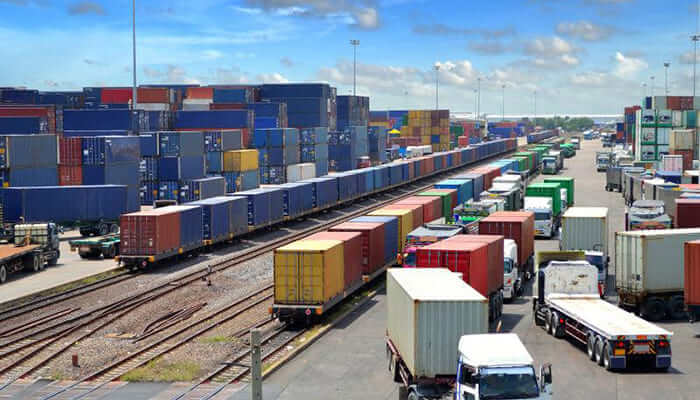There are many abbreviated trade terms in international shipping contracts. They describe many related matters, such as the time and place of delivery, the method of payment, the transfer of title to the goods, and who pays the freight and insurance costs.
The most common trade term is the International Code for the Interpretation of Trade Terms (published by the International Chamber of Commerce), but companies shipping to the United States must also comply with the Uniform Commercial Code.
Therefore, it is important for the shipper and consignee to determine which terms they will use in the contract of carriage.
Today, we are going to discuss one of the most commonly used international trade terms in international shipping — FOB.
- What is FOB shipping?
- What is FOB Origin?
- What is the FOB destination?
- What’s the difference between Fob shipping and Fob destination?
- Who pays for shipping on the FOB destination?
- What is FOB shipping point freight collection?
- What does FOB shipping point mean in accounting?
- Example of FOB shipping point
- How can ASL help you?
What is FOB shipping?
FOB refers to “free on board” or “freight on board”is a shipping term,which means that the seller retains the legal title to the goods until they reach the location of the buyer. In this case, the seller pays for the transportation of the freight and takes care of additional freight charges until the goods reach the buyer.
In other words, the supplier is “free” of responsibility. ‘On board’ simply means that the goods are on the ship.Such as if a pallet of jewelry is lost or damaged in shipment, the buyer must file any claims for reimbursement – not the seller – since the shipment became the buyer’s responsibility immediately.

What is FOB origin?
FOB Origin Simplified
The sale is completed at Seller’s Wharf
The buyer is responsible for the freight and liability during transportation
Responsibility is transferred after the goods are loaded on the conveyance
F.O.B. country of origin when goods are purchased, title to the goods passes to the consignee when the goods are delivered to the carrier at the country of origin. the shipper (vendor) should be promptly paid for all merchandise signed for on the carrier’s original bill of lading whether or not the goods were actually received.
This is also true in the case of damaged goods received, provided that the carrier specifies the route to be used in the purchase contract. Otherwise, call DGS Transportation Management for assistance before you pay the vendor. By law, the carrier must charge for carriage. A properly prepared claim must be made against the carrier to recover the amount of the loss or damage, including the freight paid for the lost or damaged part of the cargo. If the whole cargo is lost, the carrier’s freight is not payable.
What is the FOB destination?
FOB (Freight on Board) Destination is a shipping term which means that the seller retains the legal title to the goods until they reach the location of the buyer. In this case, the seller pays for the transportation of the freight and takes care of additional freight charges until the goods reach the buyer.
FOB Destination Simplified:
The seller owns the goods in transit and is responsible for freight charges
The seller assists with the settlement of claims and is responsible for full-replacement of damaged items
Title passes when the goods reach their destination: the seller keeps title and control until delivered to and accepted by the buyer
What’s difference Fob shipping and Fob destination?
The FOB point of shipment and destination qualifiers are sometimes used to reduce or expand the supplier’s responsibility in a FOB shipping agreement.
With FOB shipping points, ownership of the goods passes to the buyer once they leave the supplier’s shipping point.
From there, title to the goods immediately passes from the supplier to the Buyer and the buyer assumes all responsibility if anything happens to the goods during any leg of the journey from there to the Buyer. For FOB destination, ownership of the goods passes to the buyer at the buyer’s loading dock.
Upon delivery of the goods to the destination, ownership of the goods passes from the supplier to the buyer. In the event of any problem with the goods during any leg of the journey to the Buyer, the supplier shall be fully responsible.
One more difference between the FOB shipping point and FOB destination lies in the costs of transport. In a FOB shipping point contract, the buyer is responsible for additional costs of shipment, as they are legally considered to be in full ownership of the product as it is picked up by the carrier.
Conversely, with a FOB destination, the seller assumes full shipping costs as well as any additional insurance or liability costs throughout transport of the product, up until it reaches the buyer’s destination.
Who pays for shipping on FOB destination?
With FOB shipping point, the buyer pays for shipping costs, in addition to any damage during shipping. The buyer is the one who would file a claim for damages if needed, as the buyer holds the title and ownership of the goods.

What is FOB shipping point freight collect?
In simple terms, FOB shipping point freight collect means that the consignee or receiver is responsible for the freight charges. It is also called ‘Collect upon Arrival’, buyer both initially pays and incurs the freight chargers,and it implies that shipping, as well as additional charges, are the responsibility of the shipment receiver.
What does FOB shipping point mean in accounting?
When the terms are FOB shipping point, the supplier relinquishes all of his responsibility for the goods at his shipping point and the buyer is obligated to cover the freight costs required for getting them to the desired location.
While shipping costs are determined by when the buyer takes ownership of a particular order of goods, a company’s accounting system is also impacted. If a shipment is sent FOB Shipping Point (the seller’s warehouse), then the sale is concluded as soon as the truck pulls out of the seller’s loading dock and is noted in the accounting system as such.
On the other side, the buyer must note in its accounting system that it has inventory on its way. That inventory is now an asset on the buyer’s books, even though the shipment has not arrived yet.
Example of FOB shipping point
In this example, we will assume that the seller, the tablet has quoted a price of $300 for the sale of electronic equipment, effective as the FOB shipping point. Additionally, we will assume that the product is marked for transport on a specific date, Aug 22. The equipment, or product, may be in transit until it arrives at the buyer’s location, which might be scheduled for Aug 28. In this case, the seller would record a sale for Aug 22, as well as tracking the sale as an account receivable and a reduction in inventory.
Furthermore, the buyer would then record the purchase of the equipment, the account payable and the increase in their inventory as of Aug 22, the date that the initial purchase took place. Since the sale was made at the point of shipping, the goods belong to the buyer, and therefore, the buyer would be responsible for paying the shipping costs. These costs might be in addition to the cost of the product.
What can ASL help you?
ASL can help you deal with all the shipping trade term and help you get a best rates. We mainly provide services such as air, sea, land and charter flights, and transport the goods to the destination at the lowest price and the fastest speed, without any miscellaneous charges.
We can transport dangerous goods, such as vape products. And have rich experience in handling dangerous goods customs clearance, free warehouse services, can meet your arbitrary needs, and a variety of transportation options for you to choose.




